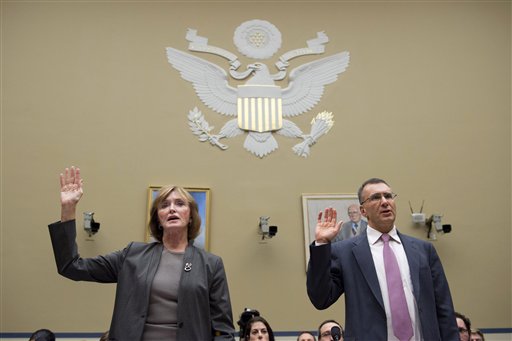WASHINGTON - MIT economist Jonathan Gruber - an often-quoted adviser on the president's health care law - told Congress on Tuesday he was glib and "inexcusably arrogant" when he said it was "the stupidity of the American voter" that led to the law's passage. Democrats tried to limit the damage as Republicans raked Gruber at a four-hour hearing, but acknowledged he gave the GOP a political gift "wrapped in a bow."
Gruber told groups in 2012 and 2013 that voter stupidity and a "lack of transparency" were important to passing the hard-fought legislation. Appearing before the House Oversight committee Tuesday, Gruber expanded on earlier apologies, repeatedly saying "I was conjecturing in areas beyond my expertise."
Enduring one fierce lecture after another, Gruber said his earlier comments were uninformed, "glib, thoughtless and sometimes downright insulting." He said he was showing off before various groups, and "trying to be something, I'm not, which was a political expert."
He said the law's passage was actually transparent and heavily debated in public, despite his earlier comments. And Gruber said he was not the "architect" of the law, as some press accounts had claimed.
But Republican Committee Chairman Darrell Issa of California called Gruber a crucial player in the legislation. Issa grilled Gruber repeatedly in what might be his last committee probe of what he calls "Obamacare." Republican term limits will force Issa - whose bare-knuckled attacks on administration programs sometimes annoy GOP leaders - to surrender the committee chairmanship in the next Congress.
Issa and other Republicans sarcastically praised Gruber for "telling the truth" in his 2012 and 2013 remarks, while also hammering his efforts Tuesday to walk them back.
Gruber remained calm, but sometimes struggled to characterize the earlier remarks. They "were not lies," he said. Rather, "they were my conjecture outside my area of expertise."
Gruber defended his consulting work, which centers on economic models that predict health care costs.
Democrats tried to make the most of having an often-vilified witness retracting some of his most damaging remarks. Rep. Elijah Cummings of Maryland, the committee's top Democrat, glared at Gruber and called his remarks from 2012 and 2013 "absolutely stupid" and "incredibly disrespectful." The remarks gave the health law's opponents a public-relations gift, Cummings told Gruber, "and you did a great job. You wrapped it up with a bow."
Also testifying Tuesday was Marilyn Tavenner, administrator of the Centers for Medicare and Medicaid Services. Issa denied her request to sit on a different witness panel than Gruber.
Tavenner apologized for earlier having given the committee data that overstated enrollment under the health care law. She said the error was caused by inadvertently double-counting people with both dental and medical insurance coverage.
Cummings said Tavenner had helped the Republicans via "an unforced error."
Issa demanded more documents about the miscount, saying his staff had easily discovered the incorrect numbers. GOP Rep. Jim Jordan of Ohio called the enrollment miscount "a deliberate deception" that was typical of Obama administration misstatements about the landmark law.
As for Gruber, Jordan demanded to know, "how much did the American taxpayers pay you to deceive them?" Gruber has said the federal government paid him about $400,000, but he declined to speculate about payments from various states. Issa said the committee will subpoena his income records.
Several Republicans pressed Gruber about his earlier remarks suggesting the administration went to lengths to portray a key element of the health law as something other than a tax. Under the law, people who fail to obtain health insurance will generally have to pay a penalty, collected with their income taxes.
Most Republicans portray that penalty as an unwanted tax. Somewhat ironically, perhaps, considering it a tax was pivotal to the Supreme Court's 2012 ruling that upheld the health care law's constitutionality.
Tuesday's hearing came as prominent Democrats are debating the wisdom of devoting much of 2009 - Barack Obama's first year as president - to the health care legislation, which finally passed in 2010 without a single Republican vote. Sen. Chuck Schumer of New York is among those Democrats now criticizing the timing. Top liberals are defending Obama, but the spat is creating new Democratic divisions after major losses in this year's elections.
Like many congressional hearings, Tuesday's produced partisan fireworks but might do little or nothing to change government policy. Obama says he will veto any effort to overturn the health care law, should such a bill reach his desk after Republicans add Senate control to their House majority next year.

